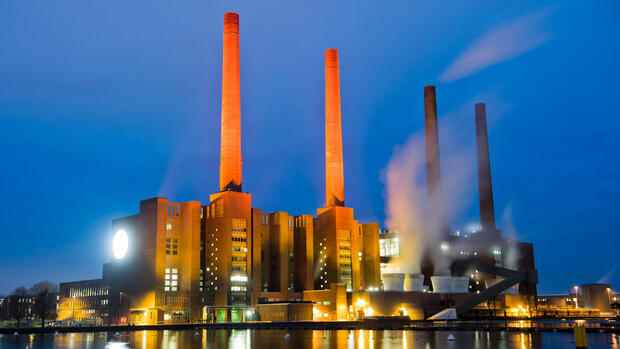The large VW power plant in Wolfsburg has been converted to natural gas, but can still be operated with coal.
(Photo: dpa)
Dusseldorf Volkswagen actually wants to convert its own power plants in Wolfsburg from coal to natural gas. But because of the political world situation, the VW group is taking its time. The group is returning gas procurement rights already purchased for next year to the market – and is expected to generate an additional 400 million euros.
In group circles, the additional income was confirmed in the hundreds of millions. The company declined to comment officially. “No comment,” said a spokesman on Sunday. The Bloomberg news agency first reported that the VW group wanted to cancel its natural gas hedge and was using coal in its Wolfsburg power plants a little longer than planned.
According to internal documents, Europe’s largest automobile manufacturer had secured a supply of 2.6 terawatt hours of natural gas for the coming year as part of its raw material supply. That’s enough natural gas to power about 200,000 single-family homes for a year.
Volkswagen had already made the advance purchases – hedging to protect against major price fluctuations – via its supplier Wingas in 2020, when the market price was around 30 euros per megawatt hour, according to company circles. Due to the unprecedented energy crisis in Europe, gas prices are many times higher today than they were then. Natural gas futures contracts in Europe are now trading at 200 euros per megawatt hour.
Top jobs of the day
Find the best jobs now and
be notified by email.
The automaker had planned to use natural gas in its two power plants in Wolfsburg next year and to do without coal. The pressure to save on natural gas prompted Volkswagen to sell its commodity contracts early. This is now affecting the two coal-fired power plants at the VW headquarters in Wolfsburg, which supply electricity for the main plant and the city.
VW wants to be climate neutral by 2050
The VW Group has set itself the goal of meeting the Paris climate targets and being completely climate-neutral by 2050. Above all, this includes carbon dioxide-free vehicle production and the associated climate-friendly procurement of electricity. For the foreseeable future, Volkswagen intends to cover its electricity needs solely from renewable sources such as water, wind and sun.
>> Read herehow the new VW boss Oliver Blume trims the group on the electric course
The conversion of coal-fired power plants to natural gas is a first step, because Volkswagen can significantly reduce the CO2 pollution of the atmosphere with natural gas. According to VW, the conversion will save 1.5 million tons of CO2 per year. That’s roughly the amount of carbon dioxide that 870,000 cars put into the atmosphere each year.
VW is currently accepting a higher environmental impact, but is also reacting to the strong political pressure to save natural gas. With the additional profit from the sale of natural gas, Volkswagen wants to compensate for cost increases in other areas, it said in Wolfsburg.
Volkswagen had already benefited from valuation effects from commodity hedging transactions in the spring and was able to report a significantly higher operating profit as a result. The valuation effect from hedging transactions for raw materials (“hedging”) accounted for around 3.5 billion euros in the first quarter. With these hedging transactions, the Group secured the purchase of important raw materials such as steel and nickel. However, around EUR 2.4 billion of this was lost again in the second quarter due to countervailing price movements.
More: VW defies the chip shortage and doubles the operating return
